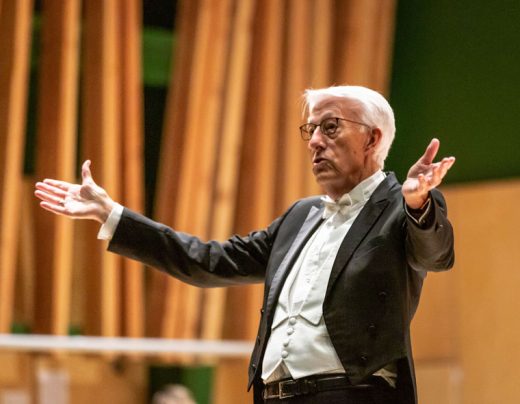
The world-renowned conductor gave final summer program performance
The Festival Choir and Chamber Festival Orchestra Concert on Sunday, Aug. 4, was the culmination of the 2019 Idyllwild Arts (IA) Summer Program and the final concert for Maestro Larry Livingston.
“It was a wonderful concert at the [Walt] Disney [Concert] Hall Sunday and also Saturday at the Lowman Center,” Livingston said. “I was very excited and the orchestra was the best ever.”
Livingston has been with the IA summer program for 31 years. Former Idyllwild Arts President Bill Lowman and Steve Fraider, who planned and developed the summer program, approached Livingston about building a substantial summer orchestral program. His first year was 1989.
At the time, Livingston was at the University of Southern California (USC), where he was building his third orchestra. “I told them what I thought it would take,” he said. “They delivered and it wasn’t easy.”
The results of Livingston’s work were on the Disney stage this month. Some of the best youth musicians in the country come to IA to learn from and perform with Livingston.
While he is an accomplished and successful youth orchestra conductor, Livingston has conducted some of the most world-renowned professional orchestras — the Houston Symphony, the Los Angeles Philharmonic, the Stockholm Wind Orchestra, orchestras in France, Poland and Italy as well as Australia and Japan.
His love is teaching and helping young musicians strive to achieve their potential. He built the youth orchestra at Interlochen Center for the Arts in Michigan, the Shepard School of Music at Rice University in Houston and finally the Thornton School of Music at USC. There were also stops at the New England Conservatory and Northern Illinois University.
While his efforts at IA have concluded, Livingston’s career will continue. He stressed that he has not retired. In March, Pam Jordan, current IA president, invited him to her office.
After praising his successful music program, she told him that this was his final summer at IA. Ransom Wilson, whom Livingston thinks is a wonderful musician, was going to replace him for the summer program and build a school-year program.
The newspaper reached out to Jordan about this statement, but she was traveling and could not reply.

Photo by Peter Szabadi
“I’m loyal to Idyllwild Arts,” Livingston said. “But at the end of the day, I’m teaching music and helping young people. Youth orchestras need passionate and inspiring teachers, not maestros.”
“Music fills my soul. Music is transforming,” he added and consequently “very rewarding.”
He said his desk is full of hundreds of letters from students and their parents thanking him for his instruction and mentorship.
Building a nationally successful youth music program requires much more than just musical talent and a good ear. Similar to a successful athletic programs, one must recruit promising and excellent students. During the year, Livingston would make 400 to 500 telephone calls to young musicians trying to recruit them to the IA summer program.
While professional musicians just want to get the rehearsal over, youth musicians are different. “I would dance on the podium occasionally,” he said. He felt that the youth rehearsals were not just preparation for performance, but “a rehearsal for life.”
To keep their attention and help them improve, Livingston sometimes tries to reach their emotions. He tried to share and exude his love of the music to the students because “love conquers all.”
Even with talent, music programs need equipment, space for practice rooms, venues and more. Livingston demonstrated his ability to solicit and attract funding when he secured $25 million from Flora Thornton, for whom the USC School of Music was renamed.
“If you want to build a new music program, you need money,” Livingston advised.
His love for music was both natural and developed. His father was a high school band director, composer and pianist. His grandmother played the saxophone and piano. At 15 years old, Livingston’s father had him playing saxophone with the local dance band.
His love for music and youth orchestra is not over, he stressed. Livingston will continue to mentor the next generations of orchestral musicians.
“This is something I am supposed to do,” he said proudly. “I was deeply saddened by IA’s decision, but I have to move on.”










